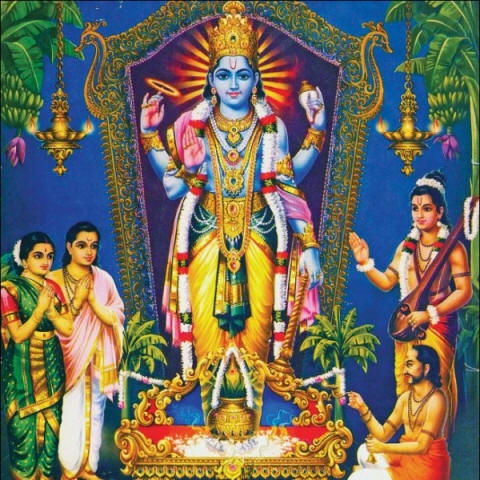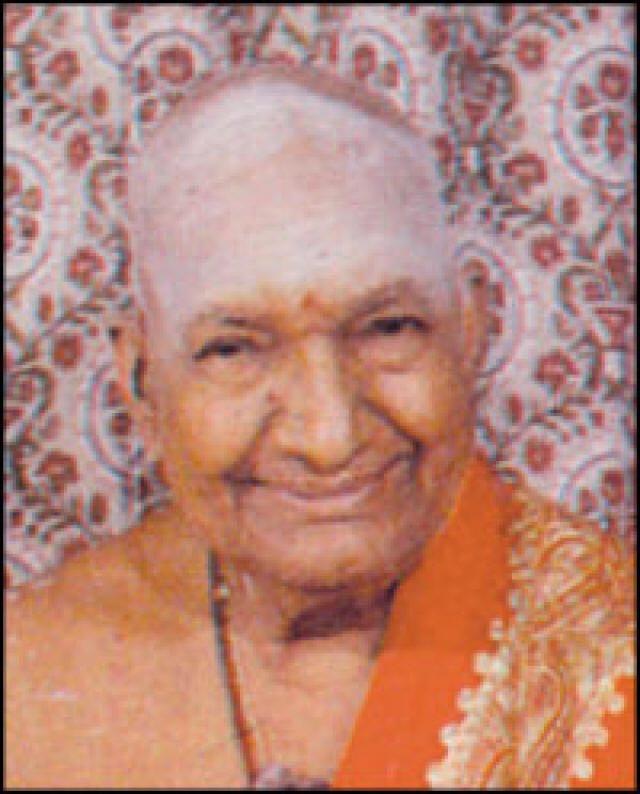Published:20 May 2019 2 PMUpdated:20 May 2019 2 PM Sakthi Vikatan
Author: வி.ஆர்.சுந்தரி V.R. Sundari
சக்தி கொடு! - 4 = Give Sakthi! - 4

2. Everyone regardless of class, religion, and other variables can observe this Viratam. Skanda Purāṇam states a devotee can observe Satyanārāyaṇa Viratam at sunrise and do the worship.
3. Those who cannot perform the Satyanārāyaṇa Viratam on the specified day for one reason or other, can observe it on Sunday, Monday, Friday, Amāvācai (the dark new moon day), Ashtami (8th Lunar day), Dvādasī (12th Lunar day), Saṅkarānti (Beginning of a month), Dīpāvaḷi (Festival of Lights) or a Saturday in Puraṭṭāsi month (17th Sep-17th Oct).
4. Besides the performance of the Viratam and the Pūja, the observants can gain merits by narrating or listening to the holy stories. The sacred texts tell that Sūthapourāṇikar narrated the story Satyanārāyaṇa Viratam during Satra Yāgam in Naimicāraṇiyam (see below) to the assembled devotees like Muṉis and their disciples, the kings, the servitors, and the general public. Before acquainting ourselves with Viratam’s rules, stipulated observances and modes of worship, let us get familiarized with sacred stories explaining the greatness of the Viratham.
naimicāraṇiyam நைமிசாரணியம் naimicāraṇiyam , n. id. +. araṇya. 1. A forest in India famous as the resort of ascetics
5. Nāradar is worthy of high regard from Asuras, and Dēvās. Both groups approached him for advice and resolution of problems. Nāradar, used to giving good advice to all, had a problem and showed up before Nārāyaṇa.
6. Bhagavan, who never tolerated suffering in his devotee, asked Nāradar, “Why does your joyous face enlightened with singing the Nāmasaṅkīrthaṉam have a withered look today?”
7. Since Mādhava himself offered to lighten the burden in his heart and mind, Nāradar opened his mouth.
8. “Paranthāmā! As an itinerant musician, I had the opportunity to go to the earth. The humankind, because of their deeds, take multiple rebirths and experience insufferable miseries. Witnessing their predicament made my mind wither and wane. I consider rescuing humanity from their miseries and help them live happily. I see no path for their salvation. I am here to seek your help on this matter. O Consort of Lakshmi! O Rescuer of devotees! For the humanity to cross the ocean of misery to the shores of liberation, I beseech you to show the way.”
9. A faint smile graced Nārāyaṇa’s face. “Nāradā! I understand your mind and thought. You came to me with a lofty thought. Singing, ‘Nārāyaṇa, Nārāyaṇa’ and uttering my holy name, you came to me on behalf of the people roiling in the sea of misery. I am impressed with your plethora of mercy. As you asked me for help, there is a path for people to live happily. They will get from me a full measure of my grace and blessing. They will gain much wealth and prosperity. At the end, they will attain Mukti (liberation). Your desire will find fulfilment. My blessings and grace are with you always.”
10. Nāradar, coming to know of removing the fading of the mind and the body, he was joyous.
11. Nīlamēhavaṇṇā! (Viṣṇu of the color of the blue clouds) who all observed the Satyanārāyaṇa Viratam?
12. Mahāviṣṇu continued, “Observance of Satyanārāyaṇa Viratam eliminates miseries. Happiness and joy will increase. The childless couple will have a child. The women will stay married for a long time. Business will thrive. One can attain distinction by education. It is important that observers of Viratam and worship must distribute Prasādam to the participants.
13. Wealth-yielding excellent Viratam.
14. Of all the holy places, Kāsi (Benares) is the sacred ground.
15. There was a Brahmana in Kasi, roiling in the throes of poverty and leading a life of begging for food. He had no wealth but a plethora of Bakthi (devotion), the latter brought the God himself to his presence. The world-sustaining Bhagavan gave Darśan of himself to the Brahmana in the form of a human.
16. As usual, he finished his meditation on Bhagavan, went on his begging rounds and then took rest under the shade of a tree. Bhagavan looked lovingly at the Brahmana, chock-full of lines and wrinkles fashioned by poverty.
17. Bhagavan: “Ayyā! You have the looks of poverty. When I see you roam and wander in search of wealth, sorrow overwhelms me.”
18. The Brahmana: “Ayyā! Seeing me under these circumstances, that Swamy does not seem to show any mercy. It must be my past sins. Eew! What am to do? Ayyā! As soon as I saw you, my mind became tranquil. I think Bhagavan Nārāyaṇā himself came in your person. If my sins vanish and a path opens at all for a good life, please let me know!”
19. Bhagavan stroked his hands and said, “Don’t worry! As you requested, your miseries will disappear and there is a way for you to come into possession of wealth: Satyanārāyaṇa Viratam. If you observe the Viratam meticulously, your grievances will dissipate and joy will increase. The wealth you are searching for, will come to you without your effort. You will have a good life.”
20. The Brahmana: “Swamy! I think God himself showed me the way to remove my penury. I will certainly observe the Viratam that you just mentioned to me. Please tell me the respective ways and means. The Swamy who described all that he needed to know for the Viratam in detail and then disappeared.
21. The Brahmana’s thoughts dwelled in Satyanārāyaṇa Viratam and lysed லயி-த்தல்) in the pathfinder God. To bring the Viratam to a successful conclusion, the Brahmana thought about the proper procedures. Upon arising in the morning, he completed the observances and as usual went on his begging rounds.
லயி-த்தல் = To be absorbed. To become dissolved, involved one within another, as the elements, worlds, till all is absorbed in the great
லயித்தல் in Tamil, laya(लय) in Sanskrit and Lysis in English are cognate and mean absorption, dissolving. To dissolve; to be reduced to original state, as the elements, etc., at the dissolution of the world
22. His heart, mind and soul felt utmost joy. He came into possession of great wealth. That day, the patrons, who usually chased him off, gave him the alms. The Brahmana came home with all the articles for performance of the Viratam.
23. Later, the Brahmana with devotion and eagerness completed the Satyanārāyaṇa Puja.
24. As the fruits of his efforts, he landed a high position. The sought-after wealth danced around in his house. His family and his relatives rejoiced in the wealth. The Satyanārāyaṇa Viratam, that the Brahmana observed, earned him Mukti (liberation).
25. Sūthapourāṇikar said, a woodcutter came to know of the greatness of Satyanārāyaṇa Pūja from the Brahmana. Let us explore it.
Practicing what you know brings wealth!
27. The Brahmana observed the God-given Satyanārāyaṇa Viratam without fail on every full moon day in the evening.
28. One day, the itinerant seller of firewood, because of fatigue and thirst, came to the Brahmana’s house.
29. The Satyanārāyaṇa Pūja was in session. The woodcutter observed the Satyanārāyaṇa Pūja eagerly. After the Pūja was over, the Brahmana gave Prasādam (sanctified food or sacrament) to all the assembled people. The woodcutter ate the food in the premises.
30. The woodcutter approached the Brahmana and asked him solicitously, “Ayyā! What was that Pūja you just did? If you tell me the why, the what, and the how of this Pūja, I will perform it and remove my miseries.”
31. The Brahmana to the woodcutter explained the Viratam, and the benefits he received. The woodcutter expressed his heartfelt thanks and said, “I learnt something good from you. I will also observe this Satyanārāyaṇa Viratam. I will see you next time, Ayyā!” He left for home.
32. On the daybreak next day, he went on his rounds selling the firewood and soon sold off all the firewood in his possession. This is the fruit of watching the Satyanārāyaṇa Pūja and eating the Prasadam.
33. ‘Is it not true that God’s grace offers its hand of help, the moment we think of doing good to others. Guess how much benefits one can receive when one offers help with fullness of the heart.’ The woodcutter exulted like this and returned home with Pūja accouterment.
34. The woodcutter observed faithfully Satyanārāyaṇa Pūja without fail. Its fruit was, indigence dancing with reckless abandon, scooted fast out of his house. The Ashta Lakshmīs (the eight auspicious Lakshmīs) moved into his house. The woodcutter lived a tranquil life with his family and at the end, attained Moksa.
35. In the next article in this series, we will read more of the greatness of Satyanārāyaṇa Viratam.
will meet again.

1. A devotee posed a question to Tirumukha Kirupāṉantha Vāriyār, “Is it proper for all to forego worship citing the reason they have no time.” Vāriyār gave a long answer. “No time! I will not accept that premise. Every day, I travel by car, rail, and plane for long distances. Despite this, I do daily Pūja for two hours. If the train journey is at six a.m., I get up at three a.m. The Pūja is over at half past five. Do people forego shaving? Do people forego early morning call to nature? When time is available for those things, will not time be made available for the worship of the deity? Laziness is the reason. Avoiding it, offer homage to God for a little time, and earn Ātma Tirupti (soul satisfaction).
E.N. Subramaniyam, Agrahāram.